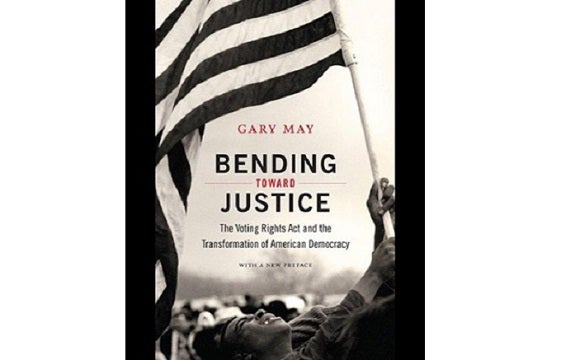Uncategorized
“Bending Toward Justice” Review

Gary May, “Bending Toward Justice: The Voting Rights Act and the Transformation of American Democracy” (New York: Basic Books, 2013; paperback Duke University Press Books, 2014)
Fifty years ago, on August 6, 1965, President Lyndon B. Johnson signed the Voting Rights Act into law. Its passage was the culmination of dramatic protests that highlighted African Americans’ lack of political rights and the absence of genuine democracy in the South. Indeed, in many places, few blacks were registered to vote. A web of restrictive practices—poll taxes, literacy tests, discriminatory voter registrars, economic coercion and outright terrorism—intentionally kept black southerners off the voter rolls. For those who managed to register, casting a ballot could cost them their jobs—or their lives.
Gaining their constitutional right to vote had long been a goal of civil rights activists. Their quest picked up steam after the signing of the Civil Rights Act of 1964, which did much to end legalized segregation but little to address the denial of the franchise.
Grassroots activists and national civil rights leaders now insisted on putting voting rights on the nation’s agenda. How they did so, and the consequences of their actions, are the subjects of Gary May’s compelling and readable “Bending Toward Justice.”
Ground zero for the voting rights struggle was Selma, Ala., where black economic and political subordination was nearly complete. The 1965 campaign benefited from the brutality of Sheriff Jim Clark, whose vicious handling of protesters gained the movement international attention and won it tremendous sympathy and political capital. There were mass arrests and ongoing violence against protesters, young and old. But the savagery of the police assault against non-violent demonstrators attempting to cross the Edmund Pettis Bridge made it impossible for national political figures to stand aloof any longer.
May recreates the dramatic and powerful story of the protests in Selma’s streets, the political maneuvering on Capitol Hill, and the long-term impact of the Voting Rights Act.
“If Negroes could vote,” Dr. Martin Luther King Jr. once declared, “there would be no Jim Clarks, there would be no oppressive poverty directed against Negroes, our children would not be crippled by segregated schools, and the whole community might live together in harmony.”
That claim has not stood the test of time, as our current racial tensions and police brutality cases attest. But the Voting Rights Act did help bring about a political revolution in the United States.
Vast numbers of African Americans registered and voted across the South; black candidates were elected to political office in unprecedented numbers; white southern Democrats migrated into the Republican Party; and overt racist appeals largely disappeared from political discourse.
However imperfect our democracy is today, the nation is a far different place than it was a half century ago.
“Bending Toward Justice” illustrates the tremendous courage and suffering that brought about that transformation. But is the voting rights victory secure? Since 2010, a growing number of conservative state legislatures have passed laws making voting more difficult, ostensibly to combat the (non-existent) problem of voter fraud.
With voting rights again under attack, May’s timely book reminds us of just how crucial the 1965 Act was and how important it remains today.
Eric Arnesen is the James R. Hoffa Teamsters Chair in Modern American Labor History at The George Washington University. He can be contacted at Arnesen@gwu.edu.